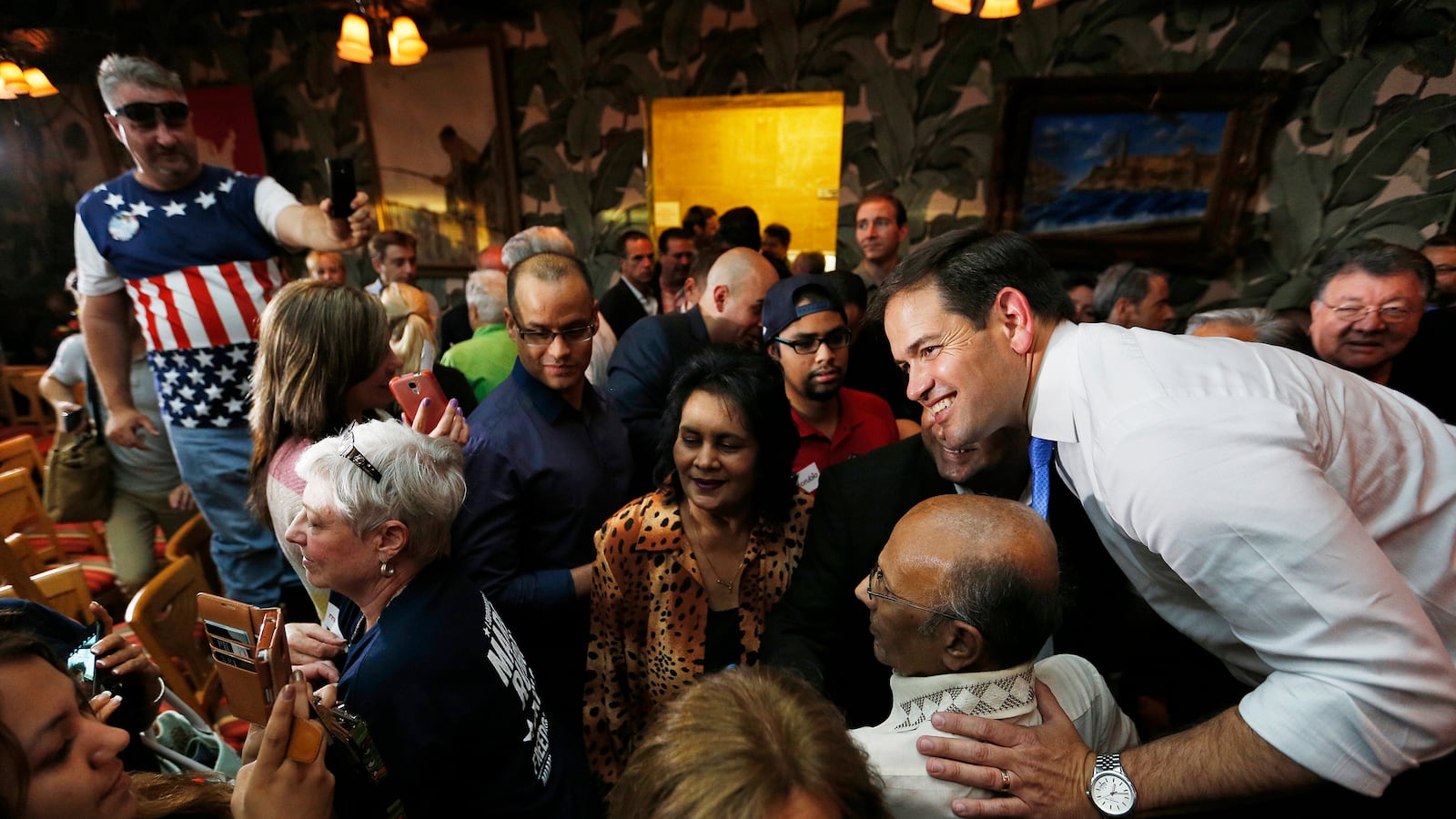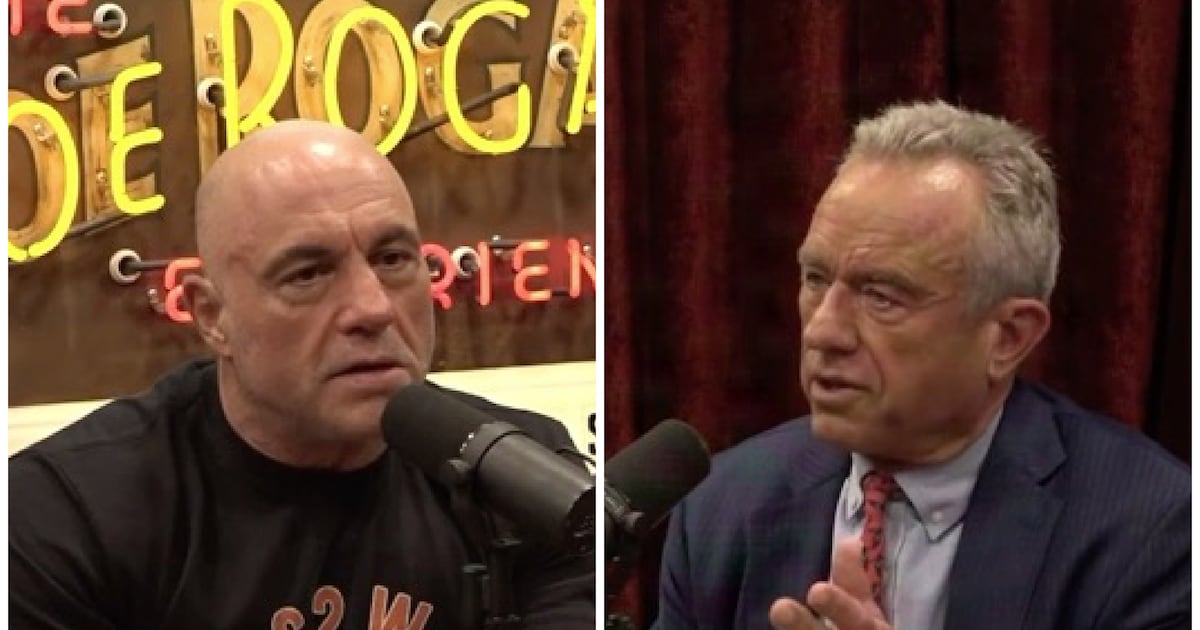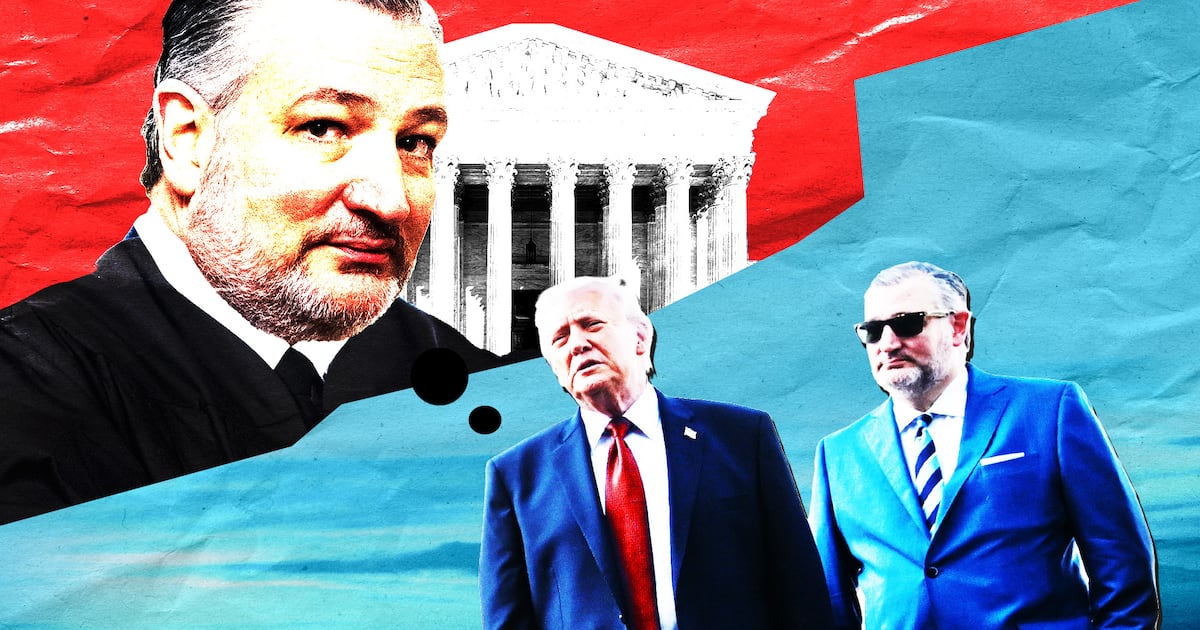Seven months ago, when Marco Rubio entered the race for the GOP nomination—joining Ted Cruz and others in a field that would grow to 17 presidential hopefuls—I created a document on my laptop and slugged it: “Rubio vs Cruz ’16.”
Not because I predicted that the Republican slugfest would eventually come down to a choice between two 44-year-old Cuban-American senators from large states, both lawyers with excellent communication skills. But because it’s not every day that a major political party offers two viable Latino presidential candidates, and I was curious about how these Republicans would measure up against one another—especially with Latinos.
Then I closed the document. The idea of such a crowded field of candidates boiling down to a matchup between Rubio and Cruz just seemed too far-fetched, especially with so much of the Republican base embracing nativism and viewing Hispanic politicians skeptically. It felt like a terrific screenplay that no writer had written—because the premise was so implausible.
Also, it seemed almost racist for me to look at such a wide array of candidates and focus exclusively on the two Latinos. Why not Rick Perry vs Scott Walker, two plausible nominees who aren’t even in the race in anymore?
And yet, here we are. All the political chatter is about Rubio, Cruz and the possibility that, when the circus has packed up and left town, the two of them could wind up fighting mano a mano for the Republican nomination.
And to think, all this is happening in the Year of Trump, where the billionaire sometimes seems ready to demand to see the birth certificates of GOP challengers with ethnic surnames. Trump got his slogan wrong. We don’t have to make America great again. The possibility of a matchup between Rubio and Cruz shows just how great America already is.
A new online poll from NBC, conducted by Survey Monkey, found that—among Republicans who watched the CNBC debate—Trump still leads the pack but not by much. He gets 25 percent of the vote, compared to 24 percent for Ben Carson. But, right on their heels, come Cruz, who jumped from single digits to 17 percent, and Rubio, who recently picked up the support of one of the most influential Republican donors in the country—New York billionaire investor Paul Singer.
Rubio and Cruz are also in third and fourth place, respectively, in the most recent national polling averages. And Rubio is third in New Hampshire and Cruz is third in Iowa, opening the possibility that either could score an early upset.
Looking at the map, it can be hard to see a path for either of these young senators to overtake Trump or Carson, let alone both of them. In this bizarre year, the outsiders still have the inside track. Not only do Trump and Carson lead the polls, they also have big advantages in the first three states holding caucuses or primaries—with Iowa now likely to go for Carson, and Trump holding steady in New Hampshire and South Carolina.
Still, the idea persists that Rubio and Cruz will be seeing a lot of one another over the next six months or so, and that both young men are in this race for the long haul. Momentum is a mysterious but powerful thing in politics, and both Rubio and Cruz seem to have it on their sides at the moment. The more Republicans see of them, the more they like what they see.
In a year when all four remaining Democratic presidential candidates are white, and three of the four are eligible for senior discounts, the optics couldn’t be better for Republicans.
In 2008, John McCain, after doing exceptionally well with Latino voters throughout his political career—often getting more than 60 percent of the Latino vote in his Senate re-election campaigns, suffered the humiliation of losing the Latino vote to Barack Obama, someone who had a thin record of serving that constituency.
In 2012, Mitt Romney, despite the fact that his father was born in Mexico and that the former Massachusetts governor had previously supported a pathway to earned citizenship for the undocumented, lost the Latino vote to Obama by a wide margin after suggesting that illegal immigrants would “self-deport” if the United States suddenly became less hospitable.
In 2016, Trump undoubtedly intended to write his own narrative, one not dependent on pandering to Latinos but fueled by pounding on them. By perfecting the art of demagoguing America’s largest minority as dangerous and defective, the GOP frontrunner is betting that he can whip up enough hysteria among white voters to win the White House.
So now here comes a new storyline—one suggesting that the real frontrunners in the GOP presidential contest, and the two candidates who might well end up facing off against one another, are the sons of Cuban immigrants.
Though they have some things in common, Rubio and Cruz are not identical twins. And those Latino voters who vote in the Republican primaries will be the first to note the differences.
While Rubio and Cruz are both just one generation removed from parents who emigrated from Cuba in the 1950’s, and both protective of legal immigration against nativists who want to roll it back, Rubio is closer to their shared culture than Cruz.
I’ve known the senator from Texas for 12 years, and I’ve described him on this site as “post-Hispanic.” By that, I mean that his heritage is an afterthought. His consciousness is broader than that.
Cruz sees himself as an American who happens to be Cuban, not a Cuban-American. He has no use for hyphens, and he finds just as great a sense of community with a white farmer in Iowa as he does with me. He doesn’t speak Spanish, and nor does he consider it essential to his identity or his life.
Finally, given that his father, Rafael, was tortured for his political activity in Cuba before escaping to the United States, Cruz considers America to be all about freedom.
I’ve never met the senator from Florida, but I have many friends who know him well. I’ve seen Rubio speak, and I came way impressed. I’ve written a dozen columns about him since he was elected to the Senate in 2010, and, frankly, most have been critical of his flip-flops on immigration.
Rubio talks often about his parents coming up the hard way, as they tried to scratch out a living as a hotel maid and bartender and set up their children with better lives. He speaks beautiful Spanish, and he’s not afraid to use it to push back against unfair questioning on Univision, the nation’s largest Spanish-language television network. For Rubio, America is all about opportunity.
I predict that Hispanic Republicans will prefer Rubio to Cruz by a 2-1 margin in the primaries. And if Rubio emerges as the nominee, he might peel off as much as 35 percent of the Latino vote in the general election. On the other hand, if Cruz is the nominee, he’ll be lucky to get 20 percent of the Latino vote. So great is his alienation from the Latino community.
At the same time, Cruz should do better with white voters who see him as being the right kind of Hispanic—namely, one who doesn’t make too much out of his heritage, culture, and ethnicity. Rubio, on the other hand, may never live down the fact that he co-sponsored—as part of the Gang of Eight—a Senate immigration bill that gave illegal immigrants a path to citizenship. Rubio has since softened his approach, though he continues to advocate that the undocumented get green cards once the border is secured. For some Republican voters, that’s a non-starter.
Rubio gets some things right, and Cruz gets other things right. And, some things, they both get wrong. That’s politics. But they’re both impressive young men that millions of voters seem to have fallen in love with. That should reflect well not just on the candidates themselves but also on the party that produced them.
This year, as far as Hispanic candidates go, Republicans have an embarrassment of riches. Take Rubio and Cruz out of the equation, and all the GOP has left is a rich guy who is an embarrassment.






